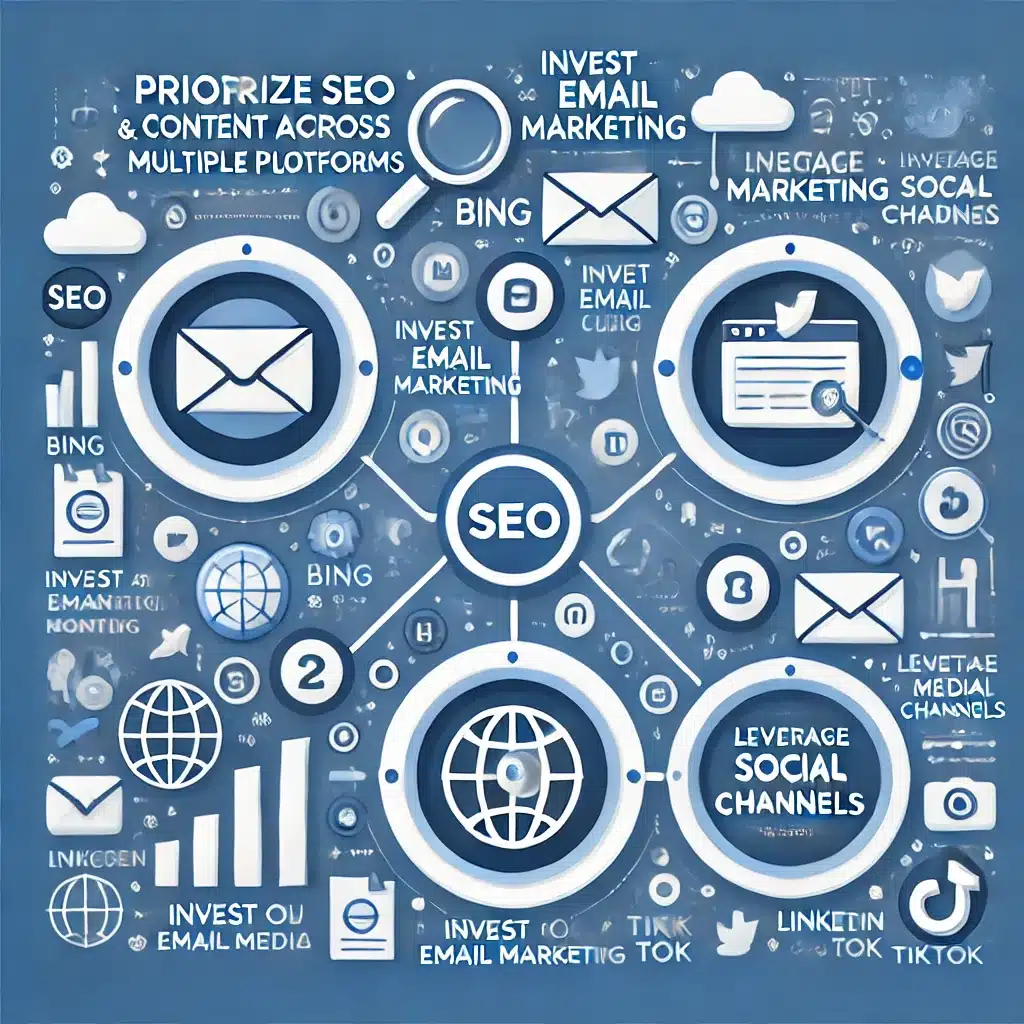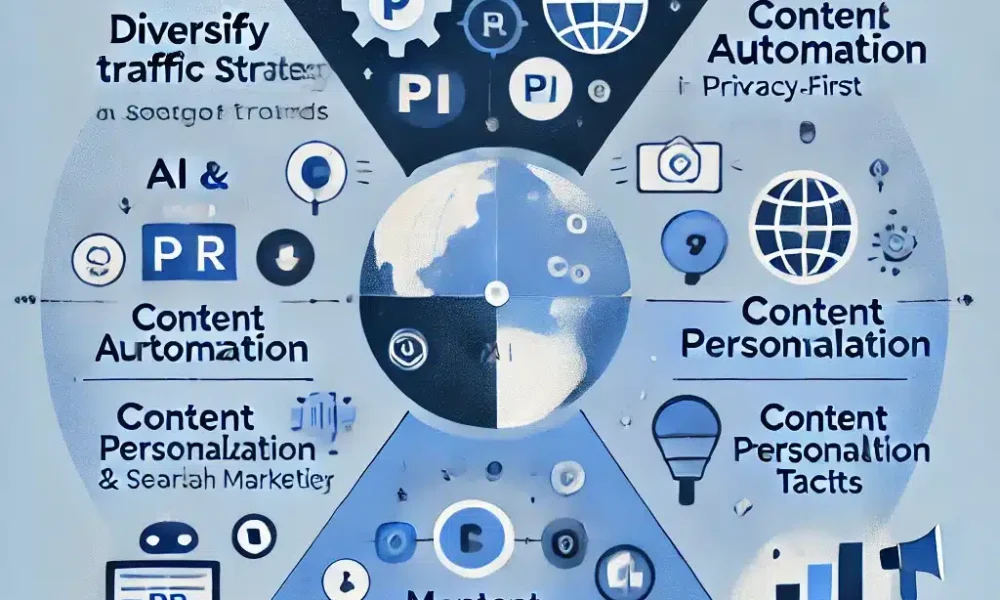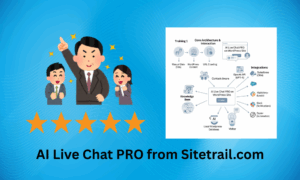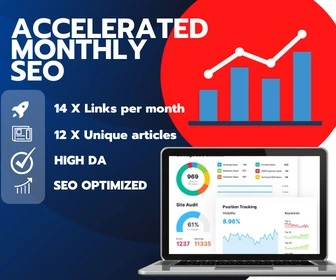Adapting PR and Content Marketing Strategies Amid Google’s Potential Breakup and Emerging Trends in 2024
The digital landscape is in a state of flux. Even as Google won an antitrust investigation in the EU, further abroad similar cases could lead to its possible breakup, a development that would significantly reshape the industry. Alongside this, content marketing continues to evolve with trends like AI-driven personalization, short-form videos, and data privacy regulations. For brands to thrive, they must future-proof their PR and content marketing strategies while remaining adaptable to various scenarios.
In this article, we’ll explore key strategies to hedge against uncertainties and ensure robust brand positioning across platforms.
1. Diversify Your Traffic Sources
Google’s potential breakup could affect its advertising and search ecosystem, causing a significant shift in the way brands drive traffic. With our Pay Per Click Management Service we have started to pair Linkedin with Google Ads – not because it is the greatest channel in B2B, but because clients require a level of independence from Google.
Actionable Tips:
- Prioritize SEO and Content Across Multiple Platforms: Brands should diversify their focus from just Google to Bing, DuckDuckGo, and other search engines. Optimizing for various search platforms ensures resilience against Google’s potential decline or reorganization.
- Invest in Email Marketing: Email lists provide a direct line to consumers and reduce dependency on third-party platforms. Focus on building a strong email list with segmented, personalized content.
- Leverage Social Media Channels: Brands should invest in a well-rounded social media strategy, utilizing platforms like Instagram, LinkedIn, and TikTok. Each channel offers unique opportunities to engage different audience segments.

2. Embrace AI and Automation in Content Creation
With the rise of AI tools like ChatGPT, brands can streamline content production while maintaining quality. These tools enable efficient workflows, especially in the face of growing demands for personalized content. With NewsPass Unlimited Access, you can leverage AI to plan a large volume of content with a precise content calendar to address your needs more broadly.
Actionable Tips:
- AI-Powered Content Creation: Use AI-driven tools for writing blog posts, product descriptions, and social media updates to save time. Ensure that content is engaging and humanized by integrating storytelling elements.
- Automated Analytics and Optimization: Leverage AI to analyze audience behavior and automatically adjust content strategies in real time. Tools like Google Analytics (or alternatives, if Google is broken up) and HubSpot offer valuable insights into what resonates with your audience.
3. Optimize for a Privacy-First World
With data privacy regulations like GDPR and CCPA becoming stricter, brands must adjust their content marketing strategies to stay compliant while building trust with consumers.
Actionable Tips:
- Adopt Transparent Data Practices: Clearly communicate how you collect and use customer data. Give users the ability to control their privacy preferences, and ensure your systems are GDPR and CCPA compliant.
- Contextual Targeting: As cookies become obsolete, focus on contextual advertising, which targets users based on the content they’re engaging with rather than their personal data. This ensures you can still reach your target audience in a privacy-friendly manner.
- First-Party Data: Start gathering more first-party data through direct interactions with customers, such as through newsletters, surveys, and loyalty programs.
4. Content Personalization with Ethical Data Use
Consumers now expect tailored experiences, but they’re also more aware of privacy issues. Brands need to balance personalization with ethical data use to foster long-term relationships.
Actionable Tips:
- Segment Your Audience: Use first-party data to segment your audience based on behaviors, preferences, and past interactions. This allows for relevant and timely content delivery.
- Dynamic Content: Personalize email newsletters, landing pages, and product recommendations using dynamic content that adjusts to the individual user’s behavior or interests. Tools like Optimizely and Salesforce enable this functionality.
5. Adapt Social Media Tactics to the Rise of Short-Form and Ephemeral Content
Short-form videos (TikTok, Instagram Reels) and ephemeral content (Instagram Stories, Snapchat) are dominating the social landscape. Brands must tap into this trend to stay relevant and engage younger demographics.
Actionable Tips:
- Leverage User-Generated Content (UGC): Encourage customers to create content around your products. UGC builds trust and drives engagement. Showcase these posts on your social media channels or website.
- Short-Form Video Strategy: Use tools like Canva or in-app editors to create compelling short videos that align with your brand message. Consistency is key—engage with audiences frequently, and post content that’s informative, entertaining, and shareable.
- Collaborate with Micro-Influencers: Influencers with smaller, loyal audiences often yield higher engagement rates. Partner with them to promote your brand through authentic content that resonates with their followers.
6. Focus on PR Beyond Traditional Media
In a world where information can spread rapidly online, brands must leverage modern PR tactics alongside traditional press to maintain control of their narrative.
Actionable Tips:
- Own Your Narrative: Create thought leadership content through blogs, podcasts, and guest articles to position your brand as an industry leader. Focus on creating valuable content that addresses current trends or concerns in your sector.
- Crisis Management Readiness: Stay prepared with a crisis communication plan. Given how fast bad news can travel online, brands should proactively prepare to address potential crises across social media, ensuring swift and accurate responses.
- Localize PR Efforts: Customize PR campaigns to cater to specific regions or market segments, especially if Google’s potential breakup leads to varied digital ecosystems in different markets.
7. Plan for a Post-Google World
While Google is still a dominant player, brands should prepare for a future where its influence may be diluted, either by competition or antitrust action. This means placing less reliance on Google’s suite of tools and services.
Actionable Tips:
- Explore Alternatives to Google Services: Instead of relying solely on Google Ads or Google Analytics, experiment with alternatives like Microsoft Ads, Statcounter, or Matomo for insights and traffic tracking.
- Invest in Direct-to-Consumer (DTC) Channels: Build stronger direct relationships with consumers through branded e-commerce platforms, apps, and social selling. This minimizes the risk of algorithm changes or policy shifts by third-party platforms.
- Strengthen Influencer Partnerships: Influencers often have strong, independent platforms across social media. Building relationships with them ensures a direct link to potential customers that doesn’t rely on a specific advertising platform like Google.
Conclusion
The future of digital marketing, particularly PR and content marketing, will likely see significant shifts as the landscape changes due to privacy regulations, emerging platforms, and the potential breakup of Google. To thrive, brands must diversify traffic sources, embrace AI, personalize content ethically, and build resilience into their strategies by exploring multiple platforms. By taking these steps, brands can ensure that they’re prepared for any scenario while continuing to grow their online presence.









